There's a ERP software called SCT Banner installed at McGill. It holds Personnel, Financial, and Student data. All of it is ELECTRONIC!! Yet another type of record that needs to be properly managed and preserved for posterity.
If your institution uses similar campus-wide software to organize human resources, financial, and student records, then the resident electronic records archivist needs to figure out how to manage these electronic records.
Food for thought!
Thursday, March 24, 2005
Friday, March 18, 2005
Mid-March Dreamin' (OT)

It's mid-March. Spring is around the corner, so the
calendar says. But there's still snow on the ground,
and a cold enough wind to make you wince.
This picture was taken last year during the summer. It
should help us find strength and endurance. Summer
will soon be here, summer will soon be here, summer
will soon be here...
Thursday, March 17, 2005
Managing emails one inbox at a time
Good ole Days
There was a time when writing and sending an email didn't mean much. One would write a note, perhaps attach a document, and then send the note. Plain and simple. The same simplicity surfaced when receiving an email. One would read the note, perhaps print it out, and then leave it be inside the inbox, probably never to be touched again. Email management was so simple. Heck, it was non-existent, unnecessary!!
Paradigm Shift
Then one day all that changed. Email evolved from a novel communication tool to a communication tool on which crucial, very crucial, mission-critical information is distributed. No longer could one send and read an email in the same way, especially if the email's content had anything to do with work, business decisions, or the like.
New Policies Require New Records Management Practices
At McGill, the university implemented a policy that made email communication between the university and students an official of communication. In other words, email communication with students became a university records, an electronic university record. Its status changed, the McGill University Archives has to consider the ways to make sure that these emails are managed and preserved for posterity.
digitalpermanence is more than a high-tech electronic records management project--it's also an educational program geared to help McGill staff adopt proper electronic records etiquette. It's meant to teach, through office visits and online tips, the best practices when managing electronic records, including emails. It's not easy since technology is so fluid--one best practice one day could be a bad idea the next. But we're convinced that education is the best starting point. By helping others understand some basic RM practices, the organization and management of email becomes less daunting and more palpable.
One inbox at a time.
There was a time when writing and sending an email didn't mean much. One would write a note, perhaps attach a document, and then send the note. Plain and simple. The same simplicity surfaced when receiving an email. One would read the note, perhaps print it out, and then leave it be inside the inbox, probably never to be touched again. Email management was so simple. Heck, it was non-existent, unnecessary!!
Paradigm Shift
Then one day all that changed. Email evolved from a novel communication tool to a communication tool on which crucial, very crucial, mission-critical information is distributed. No longer could one send and read an email in the same way, especially if the email's content had anything to do with work, business decisions, or the like.
New Policies Require New Records Management Practices
At McGill, the university implemented a policy that made email communication between the university and students an official of communication. In other words, email communication with students became a university records, an electronic university record. Its status changed, the McGill University Archives has to consider the ways to make sure that these emails are managed and preserved for posterity.
digitalpermanence is more than a high-tech electronic records management project--it's also an educational program geared to help McGill staff adopt proper electronic records etiquette. It's meant to teach, through office visits and online tips, the best practices when managing electronic records, including emails. It's not easy since technology is so fluid--one best practice one day could be a bad idea the next. But we're convinced that education is the best starting point. By helping others understand some basic RM practices, the organization and management of email becomes less daunting and more palpable.
One inbox at a time.
Wednesday, March 09, 2005
Frequency of Posts
There are some blogs that are updated daily--in fact, continuously updated throught the day. But this blog will not be one of them.
I plan on updating this blog at most two times per week (I'm thinking maybe Wedneday and Friday). I think this should be enough to keep readers updated on what's going on with the project.
I plan on updating this blog at most two times per week (I'm thinking maybe Wedneday and Friday). I think this should be enough to keep readers updated on what's going on with the project.
Friday, March 04, 2005
All Systems Go!
What is the DIGITAL Archive?
The DIGITAL Archive is the ad-hoc (semi-official but mostly unofficial) blog of the McGill University Archives' digitalpermanence project. This is the place where, from time to time (if we are not too busy with the project), we shall post updates and such regarding the project.

What is digitalpermanence?
digitalpermanence! That's digital permanence, bold and italicized, and all one word for greater effect and punch.
But what is digitalpermanence?
digitalpermanence, established in January 2004, is a McGill University Archives initiative , in collaboration with other strategic McGill units, designed and developed to manage and preserve the electronic records of institutional value to McGill University.
As part of its responsibilities, the McGill University Archives manages and preserves the paper records of institutional value--for example, Senate and Board of Governors' Minutes, Students Records, Personnel Records, and so on. But times, they are a changin' because now so many of those paper-based records are being replaced by electronic versions. While the media has changed, the mission of the McGill University Archives remains the same: it must acquire, manage, and preserve for the long-term the records of the university, regardless of format.
Since electronic records pose such a challenge due their dependency on computer technology (which, as we know, changes and evolves and transforms so rapidly in such a short span of time), the McGill University Archives is responding with a systematic, on-going, investigative and proactive approach: digitalpermanence. In other words, the University Archives will endeavour to develop the procedures, protocols, mechanisms to manage the electronic records created by McGill University, preserve such records for the long-term, and make them accessible to researchers.
What's Next!
The campus inventory is complete; the results from this survey are being analyzed and will soon be made available on our project website. For now, what is available on our project website are some helpful tips for all matters digital, from managing email inboxes and establishing scanning standards and procedures to creating a classification scheme to organize and manage your electronic documents. It's all there to download. Just visit our digitalpermanence project website.
So it's all systems go...we have lift-off!
Stay up-to-date by visiting our website or subscribing to our Announcements RSS news feed

Cheers!
The DIGITAL Archive is the ad-hoc (semi-official but mostly unofficial) blog of the McGill University Archives' digitalpermanence project. This is the place where, from time to time (if we are not too busy with the project), we shall post updates and such regarding the project.

What is digitalpermanence?
digitalpermanence! That's digital permanence, bold and italicized, and all one word for greater effect and punch.
But what is digitalpermanence?
digitalpermanence, established in January 2004, is a McGill University Archives initiative , in collaboration with other strategic McGill units, designed and developed to manage and preserve the electronic records of institutional value to McGill University.
As part of its responsibilities, the McGill University Archives manages and preserves the paper records of institutional value--for example, Senate and Board of Governors' Minutes, Students Records, Personnel Records, and so on. But times, they are a changin' because now so many of those paper-based records are being replaced by electronic versions. While the media has changed, the mission of the McGill University Archives remains the same: it must acquire, manage, and preserve for the long-term the records of the university, regardless of format.
Since electronic records pose such a challenge due their dependency on computer technology (which, as we know, changes and evolves and transforms so rapidly in such a short span of time), the McGill University Archives is responding with a systematic, on-going, investigative and proactive approach: digitalpermanence. In other words, the University Archives will endeavour to develop the procedures, protocols, mechanisms to manage the electronic records created by McGill University, preserve such records for the long-term, and make them accessible to researchers.
What's Next!
The campus inventory is complete; the results from this survey are being analyzed and will soon be made available on our project website. For now, what is available on our project website are some helpful tips for all matters digital, from managing email inboxes and establishing scanning standards and procedures to creating a classification scheme to organize and manage your electronic documents. It's all there to download. Just visit our digitalpermanence project website.
So it's all systems go...we have lift-off!
Stay up-to-date by visiting our website or subscribing to our Announcements RSS news feed

Cheers!
Subscribe to:
Comments (Atom)
about the author
- David Kemper
- I am an information professional, researcher, and writer with over eight years experience in the information services field with experience in information and communication technology.
I have a B.A. in History and a Master's in Library and Information Studies and working on a Web and Multimedia Design certificate.
I believe that empowering people with information can enrich lives and transform the world.


